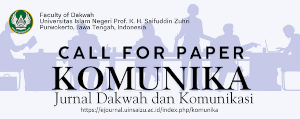BER-EUKA KERJA ISLAMI: IBADAH DAN DAKWAH DI TEMPAT KERJA
DOI:
https://doi.org/10.24090/komunika.v5i1.768Keywords:
Value, Work, Staff, ReligionAbstract
Islamic work ethic is an Islamic ethic that has been pradiced among the staff base on Islamideaching. islamic work ethic is very important applied in the workplace as a guide staff in performing work in accordance with the values of religious teachings, because the Islamic religion is not only seen as the work of worshipthatwill getthe reward forthe perpetrators, butalso can affedtheformation of a good culture work environment. In this case the ethical work has implications for the effort dakwah bil hal to others in the work environment.Downloads
Download data is not yet available.
References
Abdullah, M. Yatimin. 2006. Pengantar Studi Etika. Jakarta: Raja Grafindo Persada.
Abi, Ummu Salmiyah. 2008. Etika Kerja dalam Islam, dalam www.spesialis- torch.com. Diakses pada November 2010.
Ali, Atabik & Muhdlor, Ahmad Zuhdi. 1998. Kamus Kontemporer Arab-lndonesia. Yogyakarta: Multi Karya Grafika.
Alwi, Muhammad. 2006. Al-Qudwah Al Hasanah. Terjemah: Samsul MunirAmin & Makhrozi. Jakarta: Amzah.
Al-Misri, Mahmud. 2006. Ensiklopedia Akhlak Muhammad SAW. Penerjemah Abdul Amin Lc. dkk. Jakarta: Pena Pundi Aksara.
Dahlan, Abdul Aziz et al. 1996. Ensiklopedi Hukum Islam. Jakarta: Ihtiar Baru Van Hoeve.
Fernanda, Desi. 2009. Etika Organisasi Pemerintah. Jakarta: Lembaga Administrasi Negara.
Fitriyanti. 2008. "Pengembangan Masyarakat melalui Dakwah Bil Hal Suatu Pendekatan Psikologis", dalam Jurnal Komunikasi. Vol. 3 Nomor 1. Lampung: IAIN Raden Intan.
Kamri, Nor Azah. 2008. “Kefahaman dan Sambutan Terhadap Kode Etik Islam: Pengalaman Tabung Hajiâ€, dalam Jurnal Syari’ah. Vol. 16.
Rapar, Jan Hendrik. 1996. Pengantar Filsafat. Yogyakarta: Kanisius.
Rusniyati. 2009. Hubungan Etika Kerja Islam dengan Komitmen Organisasi: Kajian Di Kalangan Kakitangan Lembaga Urusan Tabungan Haji. Malaysia: UMM.
Saefudin. 1989. Strategi Dakwah Bil Hal. Jakarta: tp.
Sihab, M. Ouraish. 2000. Wawasan ai-Our’an Tafsir Maudlui atas Pelbagai Persoalan Umat. Bandung: Mizan.
Tasmara, Toto. 2002. Membudayakan Etos Kerja Islami. Jakarta: Gema Insani Press.
Abi, Ummu Salmiyah. 2008. Etika Kerja dalam Islam, dalam www.spesialis- torch.com. Diakses pada November 2010.
Ali, Atabik & Muhdlor, Ahmad Zuhdi. 1998. Kamus Kontemporer Arab-lndonesia. Yogyakarta: Multi Karya Grafika.
Alwi, Muhammad. 2006. Al-Qudwah Al Hasanah. Terjemah: Samsul MunirAmin & Makhrozi. Jakarta: Amzah.
Al-Misri, Mahmud. 2006. Ensiklopedia Akhlak Muhammad SAW. Penerjemah Abdul Amin Lc. dkk. Jakarta: Pena Pundi Aksara.
Dahlan, Abdul Aziz et al. 1996. Ensiklopedi Hukum Islam. Jakarta: Ihtiar Baru Van Hoeve.
Fernanda, Desi. 2009. Etika Organisasi Pemerintah. Jakarta: Lembaga Administrasi Negara.
Fitriyanti. 2008. "Pengembangan Masyarakat melalui Dakwah Bil Hal Suatu Pendekatan Psikologis", dalam Jurnal Komunikasi. Vol. 3 Nomor 1. Lampung: IAIN Raden Intan.
Kamri, Nor Azah. 2008. “Kefahaman dan Sambutan Terhadap Kode Etik Islam: Pengalaman Tabung Hajiâ€, dalam Jurnal Syari’ah. Vol. 16.
Rapar, Jan Hendrik. 1996. Pengantar Filsafat. Yogyakarta: Kanisius.
Rusniyati. 2009. Hubungan Etika Kerja Islam dengan Komitmen Organisasi: Kajian Di Kalangan Kakitangan Lembaga Urusan Tabungan Haji. Malaysia: UMM.
Saefudin. 1989. Strategi Dakwah Bil Hal. Jakarta: tp.
Sihab, M. Ouraish. 2000. Wawasan ai-Our’an Tafsir Maudlui atas Pelbagai Persoalan Umat. Bandung: Mizan.
Tasmara, Toto. 2002. Membudayakan Etos Kerja Islami. Jakarta: Gema Insani Press.
Downloads
Published
2016-11-18
Issue
Section
Articles
License
Authors who publish with this journal agree to the following terms:
- Authors retain copyright and grant the journal right of first publication with the work simultaneously licensed under a Creative Commons Attribution-ShareAlike 4.0 International License that allows others to share the work with an acknowledgement of the work's authorship and initial publication in this journal.
- Authors are able to enter into separate, additional contractual arrangements for the non-exclusive distribution of the journal's published version of the work (e.g., post it to an institutional repository or publish it in a book), with an acknowledgement of its initial publication in this journal.
- Authors are permitted and encouraged to post their work online (e.g., in institutional repositories or on their website) prior to and during the submission process, as it can lead to productive exchanges, as well as earlier and greater citation of published work (See The Effect of Open Access).
























